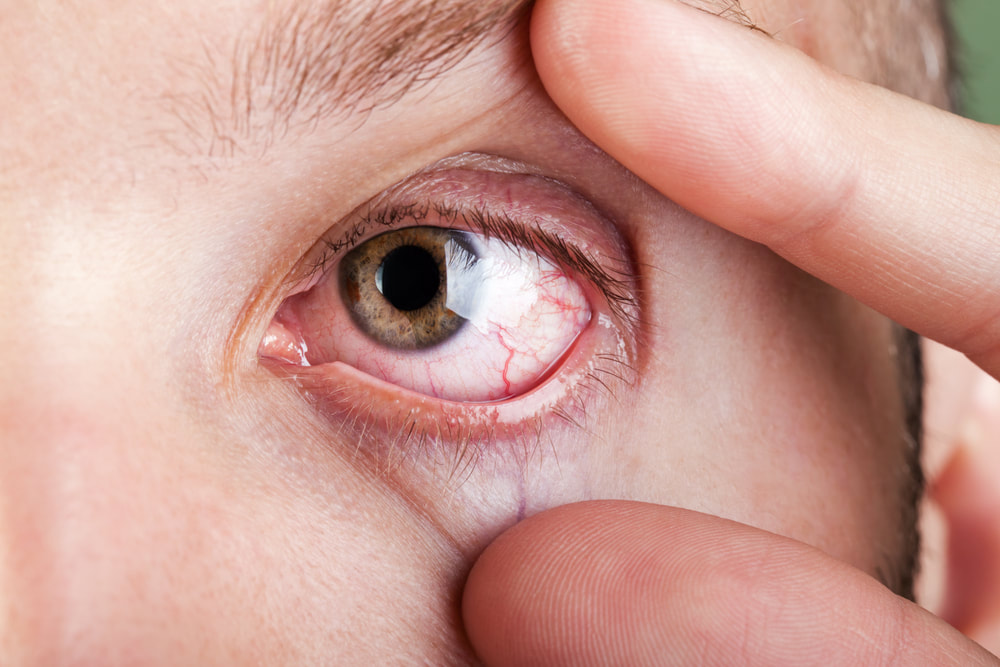Definition of ocular sarcoidosis?Ocular sarcoidosis is a possible complication of sarcoidosis. It occurs when there is a buildup of granulomas on the eye. Any part of the eye can be affected. Granulomas lead to inflammation, which can damage the eye. According to research in the journal Clinics in Chest Medicine, sarcoidosis is one of the main causes of inflammatory eye disease. Different symptoms and vision problems can develop depending on what part of the eye is affected, including the following: Uveitis: Uveitis involves inflammation of the uvea, which is the middle layer of tissue in the wall of the eye. It contains the iris, choroid, and ciliary body. Eyelid changes: Ocular sarcoidosis can also cause changes in the eyelid, such as a thickening of the skin. The conjunctiva, which is the membrane covering the eye, may also become inflamed due to the buildup of granulomas. Inflammation of the blood vessels: Other parts of the eye may also develop inflammation, such as the blood vessels and nerves that surround the eye, as well as the tear-producing glands. SymptomsSymptoms of ocular sarcoidosis may develop suddenly or come on gradually. In some cases, they resolve in a few months, but for others, ocular involvement can persist for months. Symptoms may include:
TreatmentTreatment for ocular sarcoidosis may vary depending on the severity of the inflammation and symptoms present. Treatment may include the following:
Eye drops: Eye drops are one of the most common treatments for ocular sarcoidosis. Usually, eye drops contain corticosteroids, which help decrease inflammation. Steroid eye drops are often used for uveitis, as well as inflammation of the tear-producing glands. In some cases, additional types of eye drops may also be used. A classification of medication called cycloplegics dilates the pupil in the eye and decreases muscle spasms. This may help decrease the pain associated with the condition. Systemic steroids: In instances where steroid eye drops are not enough, oral steroids may be recommended. Oral steroids also reduce inflammation. In addition to being administered by mouth, steroids can also be given through an injection directly into the eye. Systemic steroids often have more side effects than steroid eye drops. Possible side effects include weight gain, anxiety, and trouble sleeping. Immunosuppressive medications: When steroids do not decrease inflammation, medication to suppress the immune system may help. Sarcoidosis causes inflammation due to an abnormal reaction by the immune system. Medication that suppresses the response of the immune system may decrease the formation of granulomas and reduce inflammation in the eye. Immunosuppressive medications can also make someone more susceptible to infection. Patients that take this type of medication need careful monitoring by their healthcare provider for side effects. Frequent eye exams: People with ocular sarcoidosis may be at higher risk for other eye diseases, such as cataracts, due to chronic inflammation. Regular eye exams are vital to check for symptoms of eye diseases that may threaten vision. If you have sarcoidosis, it is essential to see an eye doctor for a baseline eye exam. If you have any questions about ocular sarcoidosis, we are happy to help. Additionally, if you would like to ask about whether an appointment with one of our eye doctors would be appropriate at this time, call our office at 508-746-8600. Comments are closed.
|
EYE HEALTH BLOGCategories
All
Archives
July 2024
|
|
Kadrmas Eye Care New England
55 Commerce Way, Plymouth, MA 02360
14 Tobey Road, Wareham, MA 02571 133 Falmouth Road (Rt 28), Mashpee, MA 02649 |
Phone Number:
1-508-746-8600 Hours: Monday through Friday — 8 AM – 4:30 PM |


 RSS Feed
RSS Feed
